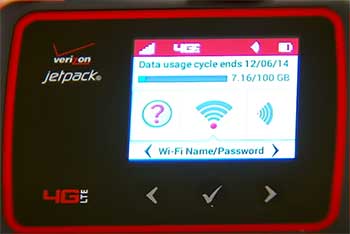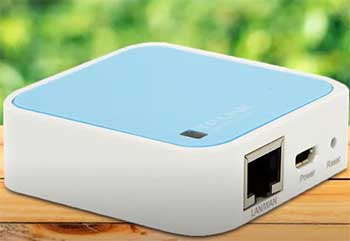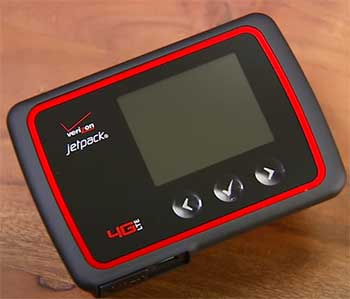Hotspots have become increasingly popular in recent years due to the growing need for mobile internet access.
Along with providing high-speed internet access, they enable users to share the internet with multiple devices seamlessly.
Today, we will examine two popular hotspot options: Verizon Jetpack, a brand of Wi-Fi hotspot devices, and Phone hotspot, a feature found in smartphones that essentially turns them into hotspot devices.
A Quick Comparison Table
| Properties | Verizon Jetpack | Phone Hotspot |
| Portability | Less portable | More portable |
| Battery life | Long | Short |
| Range | Wider | Limited |
| Speed | Faster | Slower |
| Cost | More expensive | Less expensive |
| Data Allowance | Larger | Limited |
| Security | More secure | Less secure |
Key Differences Between Verizon Jetpack And Phone Hotspot
A Hotspot, generally, refers to a physical location where you can connect to a Wi-Fi network and access the internet. However, it can also refer to a dedicated hotspot device, like Verizon Jetpack, or the built-in hotspot feature on your phone.
For our analysis, we will use the term “Hotspot” to mean either a standalone hotspot device or the hotspot feature on your phone. Alright, let’s begin!
- Portability

Both Verizon Jetpack and phone hotspot are portable and can be easily carried around.
Jetpacks are standalone devices, offered by Verizon Wireless.
They are small, compact, and lightweight meant to easily fit into pockets or bags.
On the other hand, a phone hotspot is built right into your smartphone and can be accessed through the device settings.
This makes it a very convenient option as you do not need to carry an extra device.
Also Read: Differences Between Bivy Stick And Garmin InReach Satellite Communicators.
- Battery Life
Verizon Jetpack, a mobile hotspot device specifically built to provide a long-lasting and reliable internet connection, is certainly going to outlast a smartphone functioning as a hotspot.
Jetpacks have powerful rechargeable batteries to support multiple devices simultaneously for an extended period, typically around 8 to 24 hours, depending on their usage and other factors.
In contrast, smartphones are designed primarily for phone calls, messaging, and other general use, with hotspot functionality, added as an additional feature.
While phone hotspots can provide a convenient way to connect to the internet on the go, they are not as reliable or long-lasting as dedicated hotspot devices like the Verizon Jetpack.
Especially if multiple devices are connected to your phone’s hotspot, it can drain your phone’s battery even faster.
- Range
Range refers to the distance between a hotspot device and the devices connected to it.
Verizon Jetpacks are designed to broadcast a stronger and more reliable signal, which allows other devices to connect to it from a faraway distance.
Their stronger range becomes particularly useful when you need to connect multiple devices.
Smartphones, on the other hand, tend to have a more limited range. They are not specifically designed to be standalone hotspot devices and instead rely on the phone’s hardware to create a wireless signal.
Therefore, while you can still connect to the internet from a reasonable distance away, the signal may not be as strong as that of a Jetpack.
- Speed

The speed of a hotspot device refers to how fast you can access the internet through them.
It depends on several factors, such as your location, the strength of your carrier’s network in that area, and the number of devices connected to your hotspot device.
Generally, Jetpacks are designed to provide faster internet speeds than those of phone hotspots.
This is because Jetpacks usually have more powerful hardware and antennas to connect to the cellular network, and they are also optimized for data transfer.
Smartphones, on the other hand, simply lack the comprehensive hardware that Jetpacks have. So, phone hotspots are less likely to provide the same quality of internet connection as Jetpacks.
Although depending on the mobile carrier and your location, a phone hotspot certainly can provide speedy internet, the quality of the internet quickly drops as more devices join its Wi-Fi network.
- Cost
Jetpacks are more expensive as they are standalone devices that you need to purchase along with a separate data plan. So, they have a higher upfront cost.
Additionally, the data plans for Jetpacks tend to be more expensive, especially if you are not a heavy data user, though its better data rates or other benefits may justify its costs.
With a phone hotspot, you don’t require a dedicated device and a separate data plan. You can use the existing data plan to share your phone’s internet connection with other devices. So, you don’t have any additional cost for a phone hotspot.
However, the cost of your phone’s hotspot can greatly vary depending on your mobile carrier, and the data plan you choose.
- Data Allowance
Data allowance refers to the amount of data you can use on a hotspot device within a certain period. It can affect the cost, speed, and overall usefulness of these devices.
Due to being designed primarily to share the internet connection to multiple devices, Jetpacks traditionally offer larger data allowances, while phone hotspots are catered for occasional use on a single device. So, data plans for mobiles tend not to be particularly extensive.
Although there are unlimited data plans for both Jetpacks and mobile phones, you should read through the data plans to find any data caps or restrictions.
- Security

Both Jetpacks and phone hotspots use encryption technology to enable secure data transmission and a safer internet connection.
However, Jetpacks come with extra security features such as firewalls and other security protocols to prevent potential security threats.
Also, heavy data users can further configure Jetpacks with advanced security settings to ensure a more secure internet connection.
On the other hand, smartphones are often used for various purposes, which may increase the risk of malware.
Also, due to fewer security features, phone hotspots might be more prone to attacks especially if the security features are not up to date.
Which Hotspot Option Should You Choose?
Well, the above comparison may have convinced you to get a Verizon Jetpack right away. But slow down; let’s discuss a little, and then make a decision.
If you are an individual who needs a secure and reliable internet connection for multiple devices while on the go, Jetpacks are a great option.
Business travelers, field workers, and those living in areas with poor internet connectivity can benefit a lot from Jetpacks, thanks to its wider network coverage and range.
On the contrary, if you are an occasional hotspot user, requiring only one or two devices to be connected to the internet, the hotspot built into your smartphone could be a good choice.
It wouldn’t make sense to go for the Jetpack considering its expensive nature.
If you decide to use your phone’s hotspot, search for a mobile carrier that offers broad network coverage and flexible data plans.
Lastly, there’s no better option, as the perfect choice for you will depend on your personal needs and circumstances.
Also Read: Comparison of Moultrie Delta Base And Edge Trail Cameras.
Frequently Asked Questions (FAQ)
Yes, a Verizon Jetpack is a hotspot device offered by Verizon Wireless.
A dedicated Wi-Fi hotspot offers superior performance and reliability compared to a phone hotspot. However, a phone hotspot is more affordable and convenient. So, what’s better would depend on your particular needs.
MiFi typically offers better performance, range, and battery life compared to using a phone as a hotspot. So, similar to other Wi-Fi hotspots, it is considered superior to a phone hotspot performance-wise.
A hotspot device, such as a MiFi or a Jetpack, can be the better option regarding performance. However, if you only need to connect one or two devices, a phone hotspot might be the better choice.
Conclusion
Ultimately, deciding between a Verizon Jetpack and a phone hotspot depends on your personal needs and circumstances.
In our article comparing Verizon Jetpack and Phone Hotspot for the road, we analyzed the most important features of each device and created a comprehensive guide to help you make an informed decision.
Revisit our article anytime you need to choose between Verizon Jetpack vs. Phone Hotspot.

